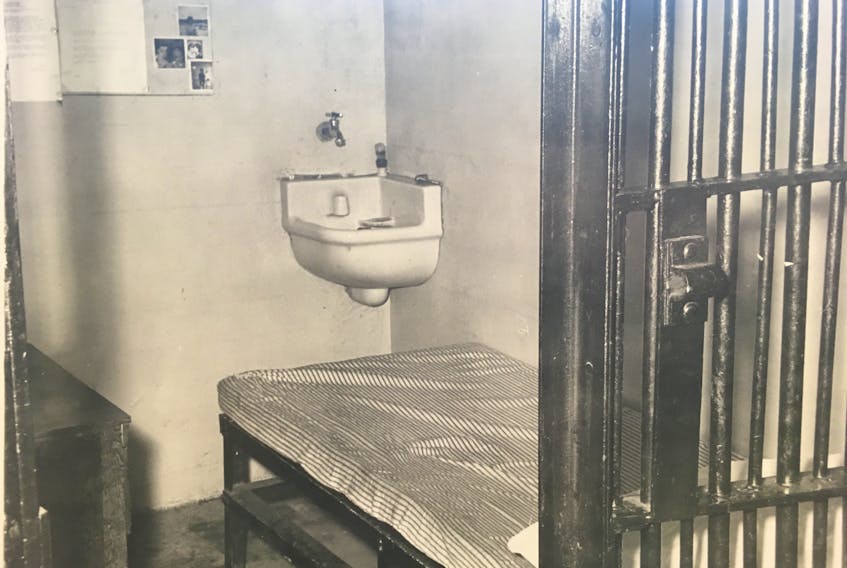
Over the years, a pattern has developed for Her Majesty’s Penitentiary (formerly His Majesty’s Penitentiary) where complaints are made about conditions at the site and the ability to deliver modern rehabilitation programming, with a response following of renovations big and small.
In waves it comes — complaints, renovations, complaints, renovations.
But no replacement prison has come.
Here’s a look back at an early letter to the editor, regarding a pre-plumbing days HMP. It was originally published on Nov. 1, 1938.
Read another article in this special report here.
•••
Editor Evening Telegram,
Dear Sir — Due to the fact that there has been a hunger strike in process at His Majesty’s Penitentiary, I take the liberty to ask you to permit me space in your widely circulated paper The Evening Telegram, so that I may be able to tell the public just why those prisoners are on hunger strike.
I will try in the following lines to portray the conditions there, as it is in protest of these set of conditions, and the need of an investigation by competent authorities on the basis of whose findings, human conditions may be instituted, instead of the present conditions which exist there.
The pail which is the prisoner’s toilet is taken by him morning and afternoon to what is termed the “hopper” and dumped.
In this the heyday of social reform and improvements, when every effort is being made by humanitarians and thinking Christian people in the causes of crime and of finding a remedy which will eliminate it from society, penology as a science is being taken up seriously by those who have the welfare of society and Christianity at heart. Newfoundland seems to be either short of penologists or would rather have in its midst a cancer (in the form of the present prison system) which is a disgrace to a country which calls itself civilized and Christian.

The prison structure is as follows: the present building was built after the institution of responsible government into Newfoundland, of stone imported from England. It contains on three corridors some 35 cells and an attic which is seldom used because of the prison camp at Colinet which takes a large number of prisoners. A cell accommodates two prisoners at present, each cell except four measures 10 by seven by nine. The cell contains two bed stocks made of plank which measure six by three, along with a bucket which is used as a toilet, also a jug and a basin. These constitute the furniture of a cell, a mug and spoon being furnished each prisoner to eat with.
Sanitary conditions
The pail which is the prisoner’s toilet is taken by him morning and afternoon to what is termed the “hopper” and dumped. When it is understood that this bucket is under the nostrils of the cell’s occupants for 17 hours a day, sleeping, eating and working, it can be seen how pure the atmosphere of a cell really is. It is an indisputable fact that as high as 10 men (to use the vulgar expression) have been lousy at one time, made so by prison clothes, which come from prison laundry and (are) supposed to be washed and clean. A basin (enamel) is used by the prisoners, in their cell, of course, for their ablutions. No provision is made for combs, or tooth brushes by the authorities. If one can afford such a luxury, all right; if not…?
Medical supervision
Every prisoner that enters the gates of the prison does so without any medical examination whatsoever. There have been incidents where men with social disease have been there for months undetected, and what harm can result from such a state is easy to imagine. A look at the hospital book is enough to show that something exists there which medicines alone will not cure. There are the periodic rashes and boils which break out on prisoners and which have caused one man at least to be permanently disfigured, the cause of which can be traced to the food which is handed out to prisoners and their methods of life.
Primitive menu
Food — the all important question on which the health of prisoners depends will be gone into in detail. The menu is: breakfast, about a pint of porridge with three or four spoonfuls of molasses in it, given out in enamel pans and which are in such a state that any citizen would not feed his dog out of them, an enamel mugful of black tea boiled and sweetened with molasses; this constitutes breakfast every day of the year for the 365 days.
Dinner on Monday and Friday, fish and potatoes, the quality of which would not warrant a National Mark, and tea which about half the men get, the others getting only water. On Wednesday beans (are) supposed to be baked with pork, but the latter is conspicuous by its absence; anyhow the prisoners get very little in the beans. On the other four days it is soup (with fresh meat on Sunday, Tuesday and Thursday) and on Saturday pea soup with salt beef and peas and water. There have been little sign of vegetables in the soup this last eight months, (much the same applies to the meat as to the pork as far as what prisoners get).
A specially baked loaf supposed to weigh a pound is given a man for a day’s ration. Milk, butter or sugar can only be got on the doctor’s orders, when he is certain that health is being impaired. Prisoners doing from 10 days to 10 years receive the same treatment. No allowance is made for the difference in time, which is an all-important factor in view of the fact that whereas a man’s health may not suffer during a short sentence he must over a period of years.
Recreation
As has been stated before out of every 24 hours, 17 are spent in the cell, seven hours being taken up in just loitering around, because in reality there is no work to do, and the food is such that hard work could not be done on it. All forms of recreation are prohibited, such as draughts, dominoes, etc., in fact to occupy oneself in such a manner calls for punishment (of) hard bread and cold water.
If the present prison system was founded to make imbeciles and degenerates out of human beings it could not have succeeded in doing it more admirably than what it has done at present.
At present there are about 10 juvenile offenders. The same treatment applies to them, they are allowed to mix with the old offenders where they pick up all the information necessary to make a good criminal. Religious services are held every Sunday. The only reason for attending (and this has been given by themselves) is that they go to break the monotony of their dire existence, and to see the girls, as they put it.
No effort is being made whatsoever to readjust the inmates to a normal existence. Instead, everything leads to the opposite. If the present prison system was founded to make imbeciles and degenerates out of human beings it could not have succeeded in doing it more admirably than what it has done at present.
When you speak or protest against such things, you are an agitator. The (members of the) prison administration know these conditions but for policy sake keep quiet. When the grand jury goes down everything is prepared for them weeks beforehand. The prisoners are not asked for complaints, and if they make any, in all probability, life would not be even so sweet.
In order for the true nature of things to be known it is necessary for the grand jury to strike off a committee from their number to interview each prisoner personally, so that he will not be scared by any possibility of intimidation.
In this way they will be able to see what sort of a curse they are paying taxes for to the tune of $80,000 per year, which is turning out not cured criminals, but animals in human form, made so by the conditions imposed on them. It is against this state of things the prisoners have gone on hunger strike, in the hope that it may cause an investigation into this house of Hell.
Thinking that I have said enough and thanking you in anticipation for the space allotted to me in your generous and human paper, I remain,
Yours truthfully,
Anthony Ryall
46 Brazil’s Square
St. John’s
Get the whole story:
Telegram Special Report explores past, present and future of Her Majesty's Penitentiary
TIMELINE: Her Majesty's Penitentiary through the years
EDITORIAL: Another decade of darkness
SPECIAL REPORT: No federal cash for HMP
PAM FRAMPTON: New prison requires new ways of thinking
Her Majesty's Penitentiary — ‘This house of Hell’
Inmate's letter speaks volumes about conditions at HMP in St. John's: friend









